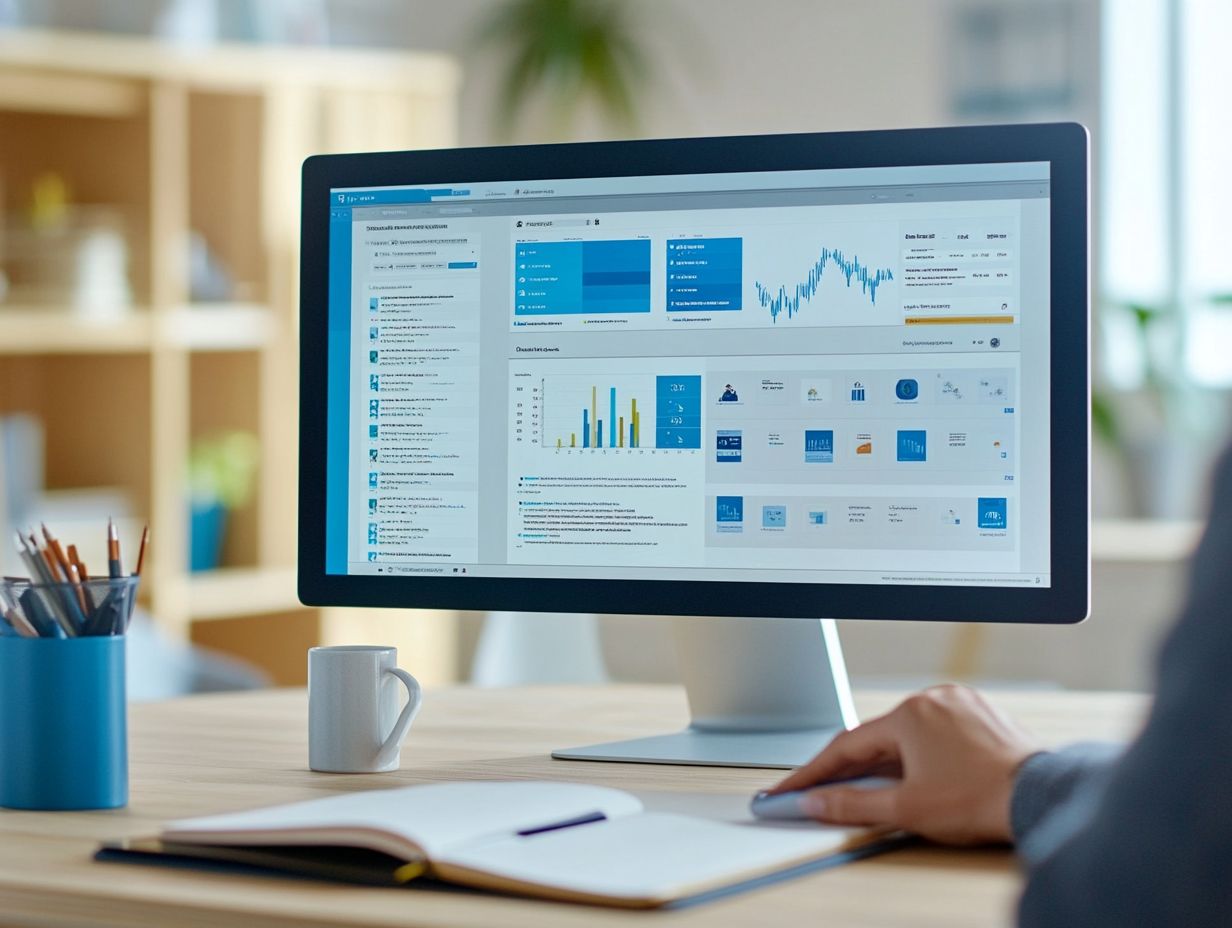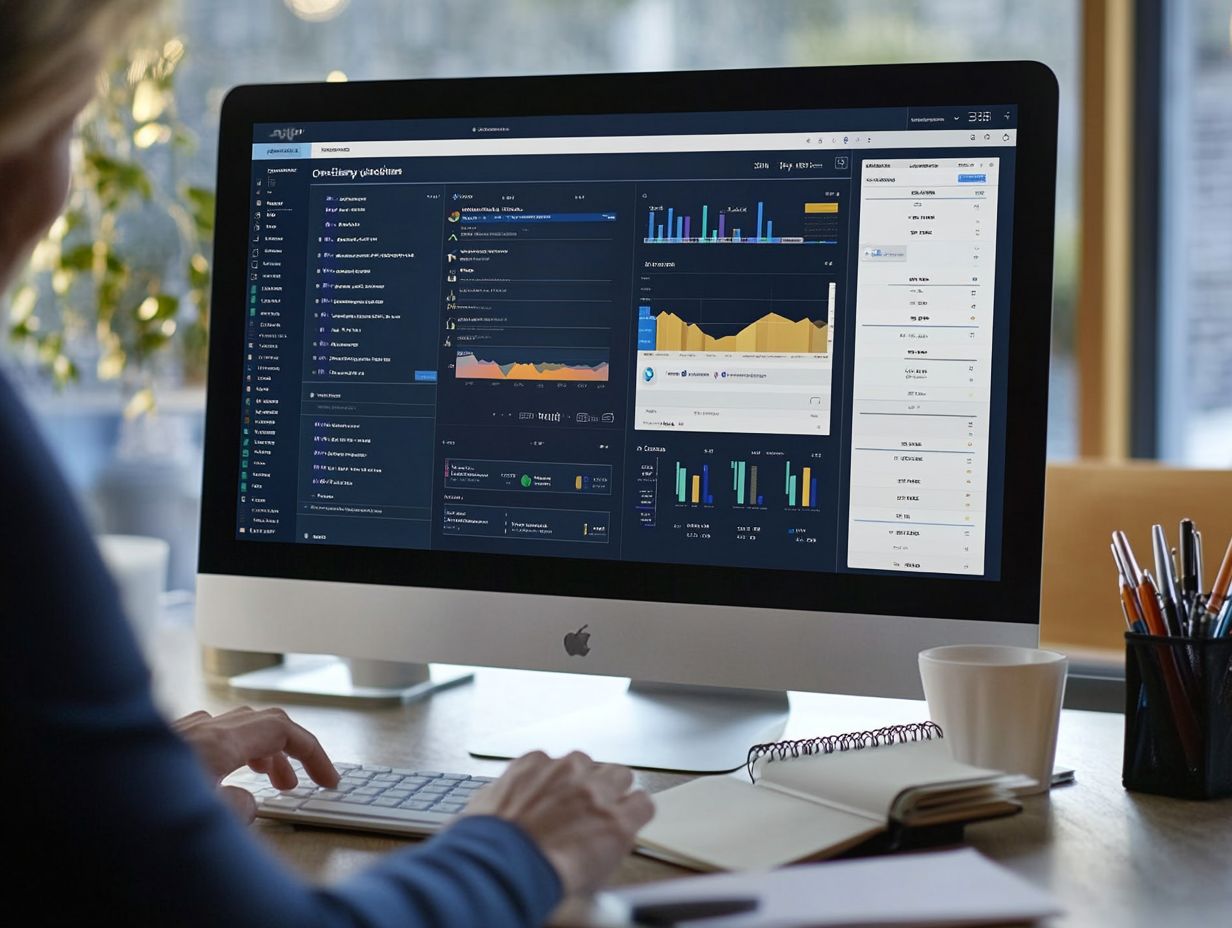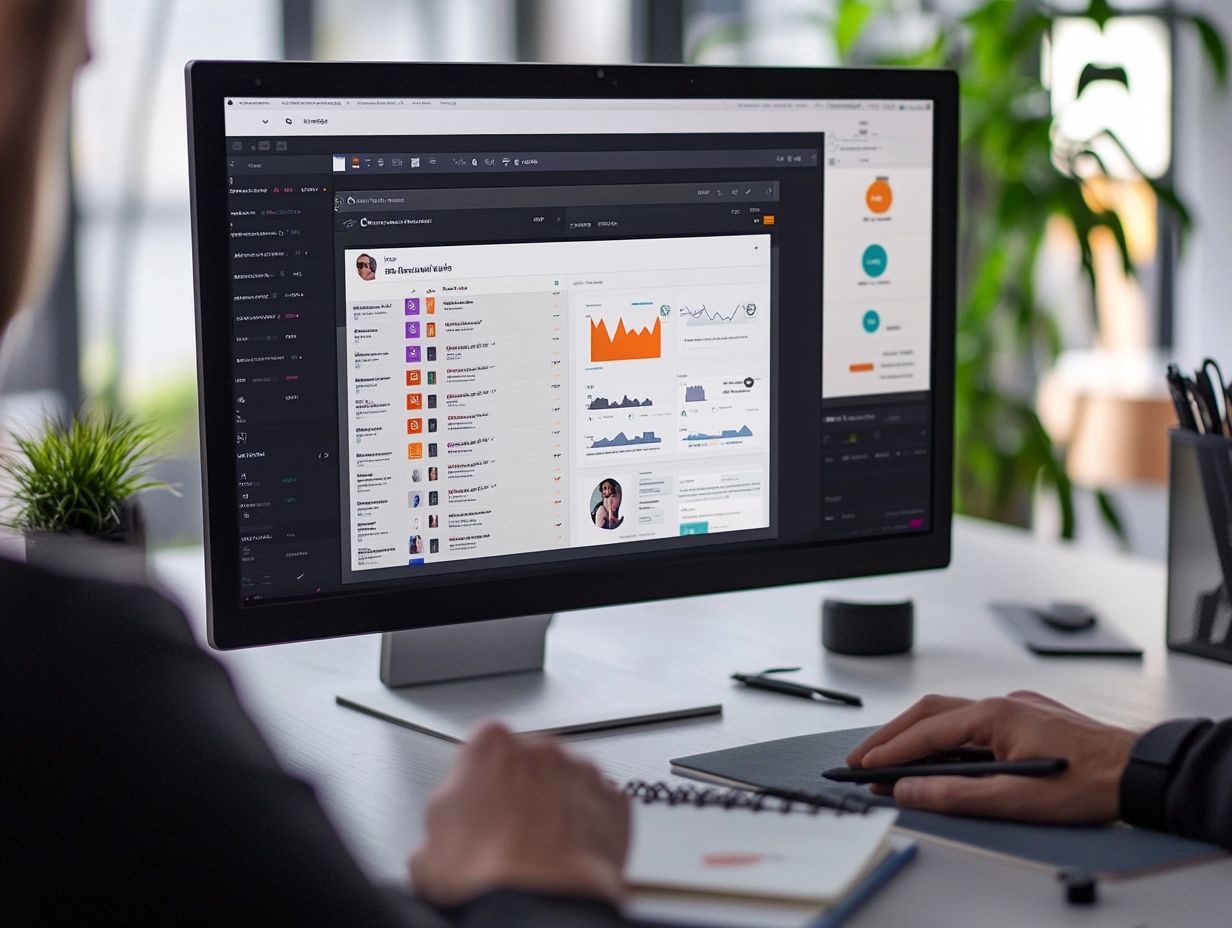What is CRM Software Licensing?
Choosing the right CRM software licensing can truly transform your business, impacting everything from your budget to the functionality you can harness.
This article dives into the essential components of CRM software licensing, beginning with a clear definition and exploring the various types available think perpetual, subscription, and open source licenses.
You ll uncover key factors to consider when selecting a license, alongside the benefits and drawbacks of each option. This guidance will help you make informed decisions that cater specifically to your unique business needs.
Whether you re navigating the waters of a small startup or steering a well-established enterprise, grasping these nuances will empower you to optimize your customer relationship management strategy effectively.
Contents
Key Takeaways:

- CRM software licensing refers to the method of obtaining and using customer relationship management software.
- There are three main types of CRM software licenses: perpetual, subscription, and open source.
- Factors to consider when choosing a license include budget, features, scalability, and integration.
Understanding CRM Software Licensing
Understanding what CRM software is and its licensing is crucial for businesses looking to optimize their CRM processes.
With a range of options at your disposal including Freshsales, Zoho CRM, HubSpot, Salesforce, and Zendesk you’ll need to navigate different types of CRM: operational, analytical, collaborative, and marketing-focused.
Each category comes with its own licensing model, influencing cost, features, and scalability. Understanding these complexities helps you manage your sales leads more effectively and elevate the customer journey.
Having a thorough grasp of these licensing options is essential for making informed decisions.
Definition and Basics
CRM software is your go-to technology for managing relationships and interactions with both current and potential customers. Its primary focus is on optimizing sales leads and enhancing customer service.
By centralizing customer information, this software gives you the power to monitor interactions and effortlessly track customer histories. The essence of CRM solutions isn t just about building stronger relationships; it s also about streamlining processes that elevate the entire customer journey.
Key functionalities include:
- Data analytics
- Reporting tools
- Automation features
These functionalities enable your sales teams to manage leads with precision. By leveraging CRM, you can personalize your communication strategies, ensuring that prospects receive timely and relevant information tailored to their needs.
This integration ultimately fosters improved customer satisfaction and loyalty, leaving a lasting impact on your sales performance.
Types of CRM Software Licenses
When you delve into CRM software, it’s essential to grasp the various types of licenses available. You’ll encounter subscription licenses, perpetual licenses, and open-source licenses each presenting distinct advantages and considerations that can profoundly influence your business’s experience with CRM tools.
Understanding these options gives you the power to make an informed choice tailored to your needs.
Perpetual License

A perpetual license for CRM software enables you to make a one-time purchase, granting you the right to use it indefinitely. This can be an astute choice for long-term customer relationship management.
This setup offers exciting benefits that can greatly enhance your efficiency!
- You can enjoy significant cost savings over time, especially when compared to subscription models that demand ongoing fees.
With a perpetual license, you retain complete ownership of the software, eliminating the risk of losing access to essential features when subscription renewals come due.
However, it’s crucial to consider some potential drawbacks, such as the hefty upfront investment required and the possible lack of regular updates or new features. This could affect the software s performance and adaptability in a rapidly changing market.
Evaluate your current CRM solutions or explore new options today!
Subscription License
Subscription licenses for CRM software require you to pay a monthly fee. This makes them an appealing choice if you’re after flexibility and the latest features in platforms like Freshsales, Zoho CRM, and HubSpot.
This payment structure significantly lowers the initial investment usually tied to outright licenses. It enables you to allocate resources more efficiently.
The scalability offered by these subscription models means you can easily adjust your plans as your business grows. You can accommodate increased user counts or additional features without the headaches of re-negotiating contracts.
Regular updates ensure that you always have access to the most current tools, boosting your productivity.
However, it s vital to weigh potential downsides. Ongoing costs can stack up over time, along with the risks of relying on the provider s uptime for uninterrupted access to your crucial business operations.
Open Source License
An open-source license for CRM software opens the door for you to access, modify, and distribute the software freely. This offers you unparalleled customization options that can be especially appealing if you’re using platforms like Bitrix24 or Insightly.
This flexibility gives you the power to tailor features according to your specific operational needs. This allows for better alignment with your unique business processes.
The collaborative nature of open-source projects cultivates a vibrant community of developers and users. They actively contribute to continuous improvement and troubleshooting, ensuring that the software evolves over time.
Using open-source licenses can be challenging. You may need some technical expertise to implement and maintain these solutions effectively.
Additionally, there are potential security risks if updates and patches aren’t managed properly. Understanding these dynamics is crucial for any organization considering an open-source CRM.
Factors to Consider when Choosing a CRM Software License
When selecting a CRM software license, consider several key factors that can significantly impact your choice:
- Budget constraints
- Essential features
- Scalability for future needs
- Integration capabilities with your existing systems
By carefully evaluating these elements, you can enhance the effectiveness of your operational and analytical CRM initiatives. This ensures that your investment aligns perfectly with your business objectives.
Budget and Cost

Budget and cost are crucial elements to consider when evaluating CRM software licenses. You need to determine how much you can allocate whether it’s a monthly subscription fee or the upfront cost associated with a perpetual license.
Making the right choice now can save you a fortune in the long run! Informed decisions regarding CRM expenditures can significantly impact your immediate financial health and long-term operational efficiency.
For example, subscription-based services like Salesforce and HubSpot typically charge users on a monthly basis. Prices range from $25 to over $300 per user, depending on the features you choose.
This flexibility enables you to scale your spending as your needs evolve. On the other hand, a perpetual license, like Microsoft Dynamics 365, often requires a larger initial investment, sometimes exceeding $20,000.
However, this can result in lower total costs over time, especially for established businesses. Carefully evaluating these options allows you to align your budget with your operational goals effectively.
Features and Customization Options
Features and customization options among CRM software solutions vary significantly. It’s crucial for you to evaluate which functionalities like tools for managing daily operations or tools for analyzing customer data are most important for your unique customer relationship management needs.
Effective sales tracking is particularly vital as it allows your teams to monitor leads, conversions, and revenue generation seamlessly. Robust customer support tools are essential for enabling your representatives to resolve client issues both promptly and efficiently.
Marketing automation features can enhance your campaigns. They facilitate targeted outreach and performance analysis.
When exploring different software licenses, consider how the degree of customization available can significantly impact your operational efficiency. A tailored CRM solution often leads to improved user engagement and better alignment with your strategic goals.
Ultimately, this enhances your overall performance.
Scalability and Integration
When selecting CRM software, you need to consider scalability and integration capabilities as essential factors. It s crucial that the solution you choose can grow alongside your organization and seamlessly connect with other tools to create a cohesive customer relationship management ecosystem.
In today s fast-paced business environment, where market trends and customer expectations can shift on a dime, this adaptability becomes even more critical. A CRM system that scales addresses your current needs. It also prepares you for future growth, ensuring you won t outpace your software.
Effective integration with your existing platforms enhances functionality, allowing for smoother workflows and deeper data insights. This integration promotes collaboration across departments, streamlining processes and improving customer interactions key elements for maintaining a competitive edge.
Benefits and Drawbacks of Different CRM Software Licenses
Grasping the advantages and disadvantages of various CRM software licenses subscription licenses, perpetual licenses, and open-source licenses is crucial for you as a business.
This understanding empowers you to make informed choices regarding your customer relationship management systems, ensuring that the solution you select aligns seamlessly with your operational goals and budget.
Pros and Cons of Perpetual License

The advantages of a perpetual license for CRM software include long-term ownership and cost-effectiveness. The drawbacks often include high upfront costs and limited access to ongoing updates and support.
Owning the software outright can offer you a sense of stability, especially if you prefer a one-time investment to recurring fees. With a perpetual license, you gain greater control over your data, which can significantly enhance security.
However, you might encounter challenges when managing outdated software, potentially missing out on valuable enhancements that newer versions provide. Support services can vary; many vendors tend to prioritize subscription-based clients, which may result in less available assistance.
Make sure to weigh these factors carefully to identify the best fit for your operational needs and budget.
Pros and Cons of Subscription License
The subscription license model for CRM software provides you with flexible payment options and access to the latest features. However, it also carries the risk of ongoing costs that can add up over time something crucial for your business to consider.
You must assess your budgeting strategies and anticipate how these recurring fees might influence your bottom line. On one hand, this pricing structure grants you immediate access to advanced functionalities without the burden of a hefty upfront investment, facilitating the integration of CRM tools into your existing systems.
On the other hand, the potential for rising expenses can strain your financial resources and demands meticulous management. The regular software updates that come with subscription licenses ensure you stay informed about improvements and innovations, enhancing your overall user experience and operational efficiency.
You should carefully weigh these advantages against the risk of being locked into a continual payment cycle, which could limit your ability to pivot or switch products as your business needs evolve.
Pros and Cons of Open Source License
Open-source licenses for CRM software offer impressive levels of customization and robust community support. However, they also demand a certain level of technical expertise and can introduce security risks if not managed with care.
With these licenses, you have the flexibility to tailor the software to fit your specific business needs while also engaging with a dynamic community dedicated to enhancing the platform. This collaborative spirit can spark rapid innovation and provide a treasure trove of shared resources, ultimately enriching your user experience.
However, it s essential to recognize the potential drawbacks, such as the necessity for skilled personnel who can navigate and maintain these systems effectively.
Popular open-source CRM platforms like SuiteCRM and Odoo showcase the balance between customization and collaboration, yet they require a solid grasp of both coding and security protocols to mitigate any risks.
Making the Right Choice for Your Business
Choosing the ideal Customer Relationship Management (CRM) software for your business requires a careful evaluation of your specific needs.
Explore various platforms like Freshsales, Zoho CRM, and HubSpot to understand how their different licensing options align with your business goals.
This assessment ensures that you make a decision that truly supports your business’s growth and efficiency.
Assessing Your Needs and Priorities
Assessing your needs and priorities is the crucial first step in selecting the right CRM software. This process helps you identify which features are essential for your customer relationship management and sales processes.
This foundational evaluation reveals areas that need immediate attention and ensures everything aligns with your broader operational goals. Consider factors like team size, sales volume, and specific customer interactions during this assessment.
This clarity helps you identify which CRM capabilities such as automation, analytics, and integration functionalities will be most advantageous. The right CRM will support targeted marketing efforts, streamline your workflows, and enhance customer satisfaction.
When these features align with your strategic objectives, you’re setting the stage for improved performance and a strong return on investment.
Consulting with Experts and Peers
Talking to experts can give you the insights you need when selecting CRM software. This approach allows you to gather perspectives from individuals with firsthand experience using various platforms and licensing models.
Engaging in these discussions can uncover common pitfalls and highlight features that enhance user experience and operational efficiency. By leveraging the collective knowledge of industry veterans and fellow users, you can align your CRM choices more closely with your needs and goals.
Hearing firsthand accounts of successes and challenges equips decision-makers with the confidence to navigate customer relationship management complexities.
These conversations not only inform your choices but can spark innovative strategies that elevate customer engagement and satisfaction.
Frequently Asked Questions
- What is CRM Software Licensing?
CRM Software Licensing is the process of purchasing a license to use a CRM software. It allows companies to legally access its features and functionalities. - Why do I need to obtain a CRM Software License?
You need a CRM Software License to legally use the software and access its features. Without a license, you may infringe on copyright and face legal consequences. - How does CRM Software Licensing work?
CRM Software Licensing usually involves purchasing a license from the software provider on a subscription basis. This license grants you the right to use the software for a specific period and may include technical support and updates. - What are the different types of CRM Software Licenses?
There are two main types of licenses: perpetual and subscription. A perpetual license allows indefinite use, while a subscription license is valid for a specific period, usually monthly or annually. - Are there any other factors to consider when obtaining a CRM Software License?
Yes, consider the number of users and features included in the license. Some licenses may have limits on users or exclude certain features. Choose a license that fits your company’s needs and budget. - Can I upgrade or transfer my CRM Software License?
Whether you can upgrade or transfer depends on the software provider s rules. It’s important to carefully review the license terms before purchasing.
Don t miss out on the chance to optimize your business today! Evaluate your current CRM needs or reach out for expert consultations.






